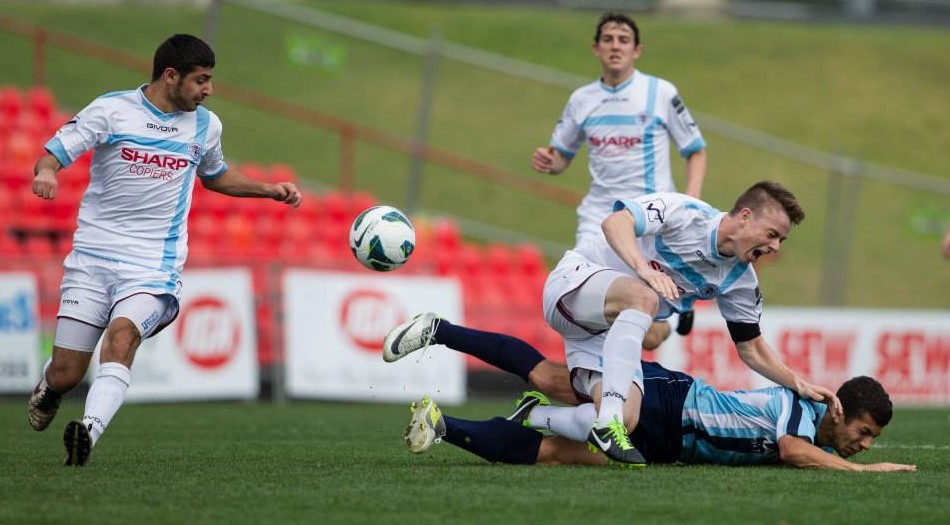What is an MCL injury? An MCL injury is a sprain or tear to the medial collateral ligament.
The medial collateral ligament (MCL) is one of four ligaments that are critical to the stability of the knee joint. It spans the distance from the end of the femur (thigh bone) to the top of the tibia (shin bone) and is on the inside of the knee joint. The MCL resists widening of the inside of the joint.
The MCL is usually injured when the outside of the knee joint is struck. This action causes the outside of the knee to buckle, and the inside to widen causing it to be stretched too far, leaving the MCL susceptible to tearing and injury. Similarly, when the lower leg is forced to splay out, like when a passing shot is blocked or in a 50:50 challenge, it can produce the same result.
An injury to the MCL may occur as an isolated injury, or it may be part of a complex injury to the knee involving multiple ligaments and cartilage damage. Early treatment of an injured knee will help to speed recovery and minimize the symptoms.
Symptoms
- The most common symptom following a MCL injury is pain directly over the ligament
- Swelling over the torn ligament may appear
- Some bruising and generalized joint swelling may occur 1 to 2 days after the injury
- In more severe injuries the knee may feel unstable
Severity of a Pulled Hamstring
Symptoms of a MCL injury tend to correlate with the extent of the injury.
- Grade I MCL Tear
This is an incomplete tear of the MCL and the symptoms are usually minimal. Patients usually complain of pain with pressure on the MCL.
- Grade 2 MCL Tear
Grade 2 injuries are also considered incomplete tears of the MCL but the damage is worse. These patients may complain of instability when attempting to cut or pivot. Swelling in more evident over the ligament and pain is more significant with straightening and bending of the knee.
- Grade 3 MCL Tear
A grade 3 injury is a complete tear of the MCL. Patients have significant pain and swelling and often have difficulty moving the knee. Instability or giving way is a common finding with grade 3 MCL tears.
Acute Management
It is vitally important that treatment to a strained MCL starts immediately following injury. The most important phase for treatment is the first 48 hours post-injury. Early management will have you back on the field faster. Suggestions for immediate treatment include:
- Stop your activity.
- Rest the injured leg.
- Use icepacks every two hours over the inside aspect of the knee, applied for 15 minutes.
- Elevate the leg above heart height whenever possible.
- Avoid exercise, heat, alcohol and massage in the first 48 hours, as these can all exacerbate swelling.
Professional help
Treatment of a MCL injury rarely requires surgical intervention. Almost always some simple treatment steps, along with rehabilitation, will allow patients to resume their previous level of activity. The time before an athlete is able to return to their sport corresponds to the grade of the injury.
Treatment of Grade I MCL Tears
Grade I sprains of the MCL are treated with rest from aggravating activity, anti-inflammatory medications and regular icing. With appropriate rehabilitation most patients with a grade I MCL tear will be able to return to sport within 1-2 weeks following their injury.
Treatment of Grade 2 MCL Tears
When a grade 2 MCL sprain occurs, use of a hinged knee brace is common in early treatment. Athletes with a grade 2 injury can return to activity once their knee is assessed as stable by their physiotherapist. Some mild pain may remain on return to play with kicking and pivoting but stability is considered the prime concern. Patients with a grade 2 injury often return to sport within 3-4 weeks.
Treatment of Grade 3 MCL Tears
When a grade 3 injury occurs patients usually wear a hinged knee brace and use crutches for the first week to 10 days following injury. After that time your physiotherapist may begin to increase the range of motion the knee brace allows. The crutches can be discontinued once the patient is able to walk without limping. The brace can be removed once your physiotherapist considers your MCL repaired and stable. Complete rehab from a grade 3 MCL tear can take 6 weeks to 4 months, unless it is associated with damage to other knee structures in which case the recovery time may be longer.
Physiotherapy provides rehabilitation and support
Physiotherapy treatment will depend upon the severity of the injury. Treatments may include:
- Hands on therapy for damaged tissues. Soft tissue therapy is excellent for reducing inappropriate scar adhesions while promoting faster healing conditions.
- Rehabilitation and strengthening exercises are used to rebuild the strength of the muscles around the knee to support the recovering MCL.
- A stretching program within bracing restrictions to encourage faster return of full range pain-free movement.
- A core stability retraining program is highly recommended.
- Provide mobility aids such as crutches or knee braces.
Preventing MCL Injuries
Although it is important to be able to treat a MCL injury, prevention should be your first priority. Suggestions to prevent the risk of MCL injury:
- Warm Up properly
A good warm up is essential in getting the body ready for any activity. Consider the FIFA 11+ warm up. - Rest and Recovery
Rest is very important in helping the soft tissues of the body recover from strenuous activity. Be sure to allow adequate recovery time between workouts or training sessions. - Core Strengthening Exercises
Exercises that challenge your ability to balance will help what is called proprioception, your body’s sense of balance. - Stretch and Strengthen
To prevent MCL injury, it is important that the muscles around the knee be in top condition. Be sure to work on the strength and flexibility of all the muscle groups in the leg.
If you have an injury and require an accurate diagnosis (investigations to be arranged as soon as possible), evidence based treatment and a comprehensive rehabilitation program taking you all the way back to your sport then contact Jubilee Sports Physiotherapy.























